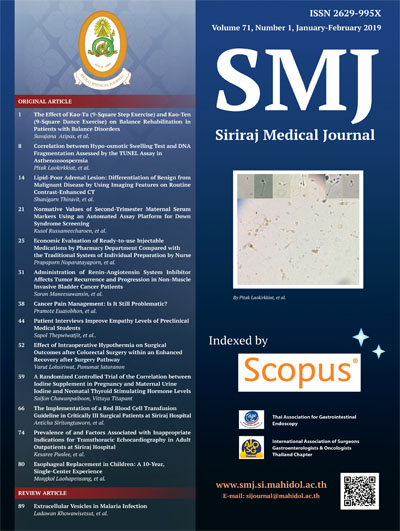Effect of Intraoperative Hypothermia on Surgical Outcomes after Colorectal Surgery within an Enhanced Recovery after Surgery Pathway
DOI:
https://doi.org/10.33192/Smj.2019.09Keywords:
Hypothermia; enhanced recovery after surgery; colon; rectum; surgery; outcomesAbstract
Objective: The adverse effects of intraoperative hypothermia from the published literature were mainly based on nonenhanced
recovery after surgery (ERAS) settings. This study aimed to determine association between intraoperative
hypothermia and outcomes following colorectal surgery under ERAS pathway.
Methods: A prospectively collected database of patients undergoing elective colorectal surgery under ERAS pathway
from 2011 to 2015 was reviewed. Patients were divided into 2 groups: hypothermic group (core temperature <36oC
continuously exceeding 30 minutes during an operation) and normothermic group. Short-term outcomes were
compared.
Results: This study included 195 patients: 150 (77%) in hypothermic group and 45 (23%) in normothermic group.
Rectal surgery (OR=5.15), operative time exceeding 3 hours (OR=3.80), multi-organ resection (OR=3.12) and male
gender (OR=2.62) were significant predictors for intraoperative hypothermia. Rates of postoperative complication
and wound infection were comparable between hypothermic patients and normothermic patients (23% vs 13%;
p=0.17 and 6.0 vs 6.7%; p=0.87, respectively). Hypothermic patients had a longer time to tolerate normal diet (2.0
days vs 1.3 days; p=0.023) but a comparable time to first bowel movement (2.6 days vs 2.6 days; p=0.84). Hypothermic
patients had a significant longer hospitalization (5.7 days vs 4.4 days; p=0.048). A multivariate analysis showed
that intraoperative hypothermia was an independent predictor for delayed food intake (OR=2.9, 95%CI=1.2-6.9;
p=0.014) but not for prolonged hospitalization (OR=1.7, 95%CI=0.7-3.9; p=0.207).
Conclusion: Intraoperative hypothermia prolonged time to tolerate food intake after colorectal surgery within an
ERAS setting but it did not adversely affect the return of bowel function, wound infection, complication and length
of hospitalization.
Downloads
Published
How to Cite
Issue
Section
License
Authors who publish with this journal agree to the following conditions:
Copyright Transfer
In submitting a manuscript, the authors acknowledge that the work will become the copyrighted property of Siriraj Medical Journal upon publication.
License
Articles are licensed under a Creative Commons Attribution-NonCommercial-NoDerivatives 4.0 International License (CC BY-NC-ND 4.0). This license allows for the sharing of the work for non-commercial purposes with proper attribution to the authors and the journal. However, it does not permit modifications or the creation of derivative works.
Sharing and Access
Authors are encouraged to share their article on their personal or institutional websites and through other non-commercial platforms. Doing so can increase readership and citations.















